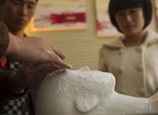
HONG KONG, April 7 (Xinhua) -- The outlook for China's economic transformation is "hopeful," and its new leadership has been " aware of the need" to make the transition, said Gorge Soros, the retired chairman of Soros Fund Management and founder of Quantum Fund in a recent interview with Xinhua.
"I think the initial signs (of the new leadership's financial policies) are very encouraging," he said, adding he is "optimistic " and China has been "at the forefront of economic planning."
China's 12th Five-Year Plan (2011- 2015) made a turning point in the country's growth model, steering the economy away from export and investment-led growth to boost domestic consumption.
"It is going to be a very difficult transformation," Soros said, adding the growth of household consumption taking one third of China's economy cannot make up for the slower growth in exports and investments, which account for two thirds of the economy.
"Therefore, the overall growth rate will have to be significantly slower than it has been up to now. That is a very important point."
He said the more than 10 percent rapid economic growth is unlikely to recur in the "more mature phase" that China is entering today.
Soros said the existing model has produced "positive results," and Chinese government has "quite substantially" accumulated reserves, such as the foreign reserve, that give them the need to correct shortcomings.
"On the whole, I think the outlook (for China's economic transformation) is hopeful," he said.
CHINA SAILS THROUGH FINANCIAL CRISIS
On China's financial regulation, Soros said the Chinese financial regulators have "a much closer and more intimate" knowledge of what goes on inside the banks, while in the West, the lack of detailed knowledge was the reason why "things went so wrong."
"I hold China's financial regulatory system in very high regard. I think they understand the problems, and they have learned lessons from the mistakes that were made in the West."
He said China was "very successful" in 2008 despite the more than 25 percent drop in export, and China had the resources to help itself sail through the financial crisis. Moreover, it has become the motor of the global economy since then, he said.
SUCCESSFUL TRANSITION HELPS BOOST STOCK MARKET
Soros said if China's authorities are successful in changing the growth model in five to 10 years with more production for consumption, it would also help lift China's stock market, which has underperformed the global stock market in the last few years.
Soros said that Chinese stock market did not go up in line with the country's overall economic growth is "not surprising" as that growth was accompanied by lack of profits, whereas stock markets generally reflect the growth of earnings instead of output.
He said if the profits of the companies that cater to the consumers could increase, those winners who can innovate and fulfill the needs and the taste of the consumers could become " very good investments."
"Of course, that would mean a larger portion of the economy would be in the hands of private enterprises rather than state- owned enterprises, and the private enterprises would be more independent from the state. That would be a big improvement in economic performance."
REASONABLE PROPERTY TAX HELPS STABILIZE REAL ESTATE
As to the overheated housing price in China, Soros said reform in the real estate sector is also a part of the country's economic transformation.
"I think real estate is rather vulnerable in China, because it has been a favorite form of savings."
He said many Chinese bought more than one apartment, so there has been a large accumulation of apartments which are empty just like savings in gold or in a bank.
"I think it is part of the transformation that at least the empty apartments will have to be sold, or maybe taxed. I think they are now a risky investment," Soros said.
He said imposing a property tax would be "very effective," adding it is better to be done "very gradually," "because they are so effective that they could create a crash."
For example, if the property tax is set quite high, a person with five apartments, of which four are empty, would have to sell them if he could not afford the tax bill. Finally the market would be flooded by apartments for sale, Soros said.
"If you have to pay just 5 percent or 3 percent tax every year whether you sell it or not, that would have the effect of pushing some people to sell."
CHARITY HELPS ENHANCE SOCIAL HARMONY
China's fast-growing economy has nurtured an increasing number of rich people in recent years. As a well-known philanthropist, Soros said some of those people have shown real interest in charity, adding it is "praiseworthy" and will contribute to social harmony.
Giving advice to those emerging charitarians in China, Soros said besides the sick and the old, it is "particularly important" to enable the children and the young people to improve themselves, providing them opportunities to learn with more scholarships.
















 Shanghai reports 2 more cases of H7N9
Shanghai reports 2 more cases of H7N9


![]()
